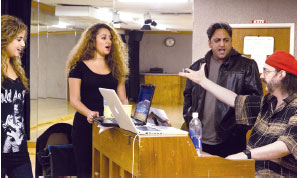|
||||||||
|
With a debut album scheduled for 2013, Camellia combines the Arabic singing style of arpeggiated vocalizations with Western instrumentation and elements to create a unique style of music. For Loving the Silent Tears, Arab newspapers such as Al-Arab, Al Watan, and Beirut Times proudly published many articles about the 23-year-old singer’s participation in the musical. She was also interviewed by television media such as KCAL Ch. 9’s Best Deals TV Show and Hollywood Weekly magazine. The following are excerpts from these various interviews about her background and the musical. Q: Tell us about your unique heritage, you are a first generation American who embraces her Lebanese and Palestinian roots. And do you believe in Muslim values? Camellia Abou-Odah: I believe the values are universal. I was raised praying five times a day since a child. And it was a moment to just kind of connect with yourself, and try and focus on some sort of a center, of what you can just conceive to be God. But in reality what’s actually happening is that it's really just connecting you to yourself, and that’s what enhances your connection to everything around you. Q: You have worked with Grammy-winning producer Danny Sembello. He praised you, saying, “Rarely do I come across a young artist who can transcend the boundaries of musical genres. Her songs are raw, organic and from the heart.” What inspires your songs?
Camellia: What I do is, I hear music, if I feel like I vibe with it, something about it compels me to want to write something to it, a melody line will just kind of come into my head. I don’t really know from where, from the surroundings, it just comes.
Q: Tell us about your meeting with the legendary singer Stevie Wonder. Camellia: It was a Living Legends Award ceremony, giving Stevie Wonder an award. We just had a conversation about life. And he ended up saying that I have the spirit of a flower and that there’s something very genuine and heartfelt, and he can hear my spirit. I’m very appreciative of that. Q: We’re going to have a wonderful chance to see you in Loving the Silent Tears. What do you think about it? Camellia: Loving the Silent Tears has been an incredible blessing because I found myself at times with the stresses and pressures that can be associated with the industry and all this. I thought I would just love to do something just positive. And it happened. So I just truly feel that the universe is a really magical place. Q: The lyrics of the songs are based on the poems from Silent Tears written by Supreme Master Ching Hai. Camellia: Supreme Master Ching Hai is a revolutionary woman. Definitely incredibly in tune and in touch with the fiber that connects everyone. She’s just done so much in so many realms, whether it comes to the vegan incentives to make people consider the animals and their feelings and the Earth and how we are destroying the Earth by eating meat. She has so much power in her generosity. I truly feel like she is someone that I can learn from and look up to. Q: What did you think about the poem that you had been given, which was adapted to music by Emmy winner Doug Katsaros to become the song, “Truth, Ego, Soul and Blessings”? Camellia: When you shed the ego in this poem, that’s when you can find the calm, the peace, the happiness, the giving, the unconditional love. I think it’s very appropriate for the artists that will be doing it together and the regions they represent. Q: What does it mean for you to perform onstage with a singer from Israel, Liel Kolet, and one from Iran, Siavash Shams? Camellia: On
an individual level, I’ve seen that they are beautiful people.
I know that in their countries of origin, there are other beautiful
people. And unfortunately, when the ego gets in the way, which is
a big theme in our song and in the musical as a whole, we begin
to have this sort of delusion of separation and me versus you. When,
in reality, we are all entities, parts of the same whole. So, the
three of us are going to participate in one song and cooperate together
and maximize the experience of the event. And hopefully, people
can take that message with them as well to do the same in their
daily lives.
|
||||||||
